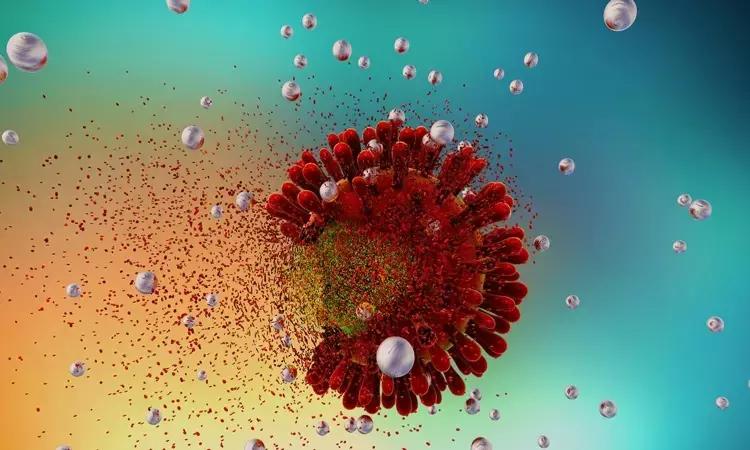- Home
- Medical news & Guidelines
- Anesthesiology
- Cardiology and CTVS
- Critical Care
- Dentistry
- Dermatology
- Diabetes and Endocrinology
- ENT
- Gastroenterology
- Medicine
- Nephrology
- Neurology
- Obstretics-Gynaecology
- Oncology
- Ophthalmology
- Orthopaedics
- Pediatrics-Neonatology
- Psychiatry
- Pulmonology
- Radiology
- Surgery
- Urology
- Laboratory Medicine
- Diet
- Nursing
- Paramedical
- Physiotherapy
- Health news
- Fact Check
- Bone Health Fact Check
- Brain Health Fact Check
- Cancer Related Fact Check
- Child Care Fact Check
- Dental and oral health fact check
- Diabetes and metabolic health fact check
- Diet and Nutrition Fact Check
- Eye and ENT Care Fact Check
- Fitness fact check
- Gut health fact check
- Heart health fact check
- Kidney health fact check
- Medical education fact check
- Men's health fact check
- Respiratory fact check
- Skin and hair care fact check
- Vaccine and Immunization fact check
- Women's health fact check
- AYUSH
- State News
- Andaman and Nicobar Islands
- Andhra Pradesh
- Arunachal Pradesh
- Assam
- Bihar
- Chandigarh
- Chattisgarh
- Dadra and Nagar Haveli
- Daman and Diu
- Delhi
- Goa
- Gujarat
- Haryana
- Himachal Pradesh
- Jammu & Kashmir
- Jharkhand
- Karnataka
- Kerala
- Ladakh
- Lakshadweep
- Madhya Pradesh
- Maharashtra
- Manipur
- Meghalaya
- Mizoram
- Nagaland
- Odisha
- Puducherry
- Punjab
- Rajasthan
- Sikkim
- Tamil Nadu
- Telangana
- Tripura
- Uttar Pradesh
- Uttrakhand
- West Bengal
- Medical Education
- Industry
New blood test predicts which COVID-19 patients will develop severe infection

Scientists have developed, for the first time, a score that can accurately predict which patients will develop a severe form of Covid-19.
The study, led by researchers at RCSI University of Medicine and Health Sciences, is published in The Lancet's translational research journal EBioMedicine.
The measurement, called the Dublin-Boston score, is designed to enable clinicians to make more informed decisions when identifying patients who may benefit from therapies, such as steroids, and admission to intensive care units.
Until this study, no Covid-19-specific prognostic scores were available to guide clinical decision-making. The Dublin-Boston score can now accurately predict how severe the infection will be on day seven after measuring the patient's blood for the first four days.
The blood test works by measuring the levels of two molecules that send messages to the body's immune system and control inflammation. One of these molecules, interleukin (IL)-6, is pro-inflammatory, and a different one, called IL-10, is anti-inflammatory. The levels of both are altered in severe Covid-19 patients.
Based on the changes in the ratio of these two molecules over time, the researchers developed a point system where each 1-point increase was associated with a 5.6 times increased odds for a more severe outcome.
"The Dublin-Boston score is easily calculated and can be applied to all hospitalised Covid-19 patients," said RCSI Professor of Medicine Gerry McElvaney, the study's senior author and a consultant in Beaumont Hospital.
"More informed prognosis could help determine when to escalate or de-escalate care, a key component of the efficient allocation of resources during the current pandemic. The score may also have a role in evaluating whether new therapies designed to decrease inflammation in Covid-19 actually provide benefit."
The Dublin-Boston score uses the ratio of IL-6 to IL-10 because it significantly outperformed measuring the change in IL-6 alone.
Despite high levels in blood, using only IL-6 measurements as a Covid-19 prognostic tool is hindered by several factors. IL-6 levels within the same patient vary over the course of any given day, and the magnitude of the IL-6 response to infection varies between different patients.
https://www.thelancet.com/journals/ebiom/article/PIIS2352-3964(20)30402-3/fulltext
Hina Zahid Joined Medical Dialogue in 2017 with a passion to work as a Reporter. She coordinates with various national and international journals and association and covers all the stories related to Medical guidelines, Medical Journals, rare medical surgeries as well as all the updates in the medical field. Email: editorial@medicaldialogues.in. Contact no. 011-43720751
Dr Kamal Kant Kohli-MBBS, DTCD- a chest specialist with more than 30 years of practice and a flair for writing clinical articles, Dr Kamal Kant Kohli joined Medical Dialogues as a Chief Editor of Medical News. Besides writing articles, as an editor, he proofreads and verifies all the medical content published on Medical Dialogues including those coming from journals, studies,medical conferences,guidelines etc. Email: drkohli@medicaldialogues.in. Contact no. 011-43720751


